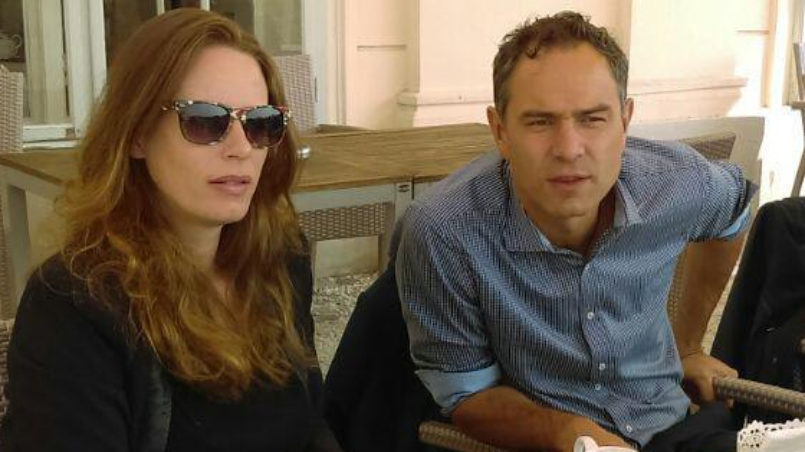Is Peace the Remit of Women?

We have arrived at the third and final part of the interview series with Dr. Daniele Ganser. The Swiss historian and energy and peace researcher, came to Vienna to hold a lecture in autumn 2016, and took the time to give some interviews for our Idealism Prevails team.
After his three-day lecture and interview marathon and shortly before his trip home to Switzerland, I asked Dr. Daniele Ganser, how and if the role of women could generally change in the sense of peace research, “to make the world a better place”.
The interview – third and final part
Conflicts. Violence. We know that men play a central role in the great international conflicts. Could, in the sense of peace research, more weight be attached to the role of women in order to put an end to the “strong fellow”? Would that be a step forward for peace research?
Dr. Daniele Ganser:
“I think that it is fundamentally important that we reach a position where the sexes are on an equal footing – that, to me, is a principle of balance. In order to resolve conflicts without violence, a balance is always needed:
A balance between arguments; a balance between classes; a balance among the poor, the rich and the middle class – as well as a balance between the sexes. Of course, we have not reached this goal worldwide, but much progress has been made in the right direction. From a Swiss perspective, I know that men thought for a long time that it would be better to exclude women from the right to vote.
Today, however, it is fortunately recognised that this development is positive. The fears of the Swiss of those days, such as ‘Switzerland will go down the drain, because the emotional women will ruin the country’ are to be regarded as completely stupid – on the contrary, one is ashamed today that this decision was taken only in 1971.
In Saudi Arabia, for example, the state of consciousness towards women is completely contrary: women are not allowed to drive a car alone, because men believe this might give them the opportunity to cheat on their husbands ! I have spoken to many Saudis who said, ‘We have to keep women on a short leash, because a woman – like a car and a house – is part of our property!’ This is, in my opinion, a state of consciousness of possessive thinking and an old consciousness, and this must be overcome.
Nevertheless, I must say that it is the conflicts between men and women within relationships which are the most difficult to resolve. This can be seen, for example, in child-rearing – there, things must be resolved together. I personally have serious problems with my wife. That’s just the way it is. Not with the Syrians, not with the Americans and not with the Russians! Sixteen years of conflict study at home – but I adore and cherish her. However, she does challenge me in a way I would sometimes like to avoid. ”
Can these conflicts between the sexes be avoided?
“No, they are not avoidable, these conflicts are simply there. But if both partners are honestly involved in the conflict, many things are possible. Incidentally, I don’t know where I would be if I did not have my wife.”
Conflicts must be challenges then…
Dr. Ganser:
“Conflicts, as I keep telling my children, are a good thing. Human beings are fundamentally lethargic and will only change when in a conflict situation. Once this conflict arises, the first impulse is often to try and avoid it. But this does not work: it won’t simply disappear, and it keeps staring you in the face. Only then will you start thinking about it and be forced to work on a solution. This requires a certain set of skills though, which must be trained and honed.
I see that conflict resolution requires a learning process, especially when dealing with my children. If a problem arises, the first reaction of a child is simple: it strikes out, it uses violence. This happens very quickly, for example, “This is mine, and if you take it, I’ll hit you on the head.” Then parental measures set in, and the situation is handled similarly in Austria and Switzerland: parents will try to defuse the situation and react to their children: ‘Hey, listen – do not beat each other up.’
In this way, parents try to defuse situations. However, it is important to look for the cause of a conflict, because often it is not immediately evident. For example, you might be in the garden watering your flowers, and a conflict suddenly flares up in the background. You turn around and see your son heartily hitting his sister on the head with the yellow plastic shovel! And immediately your thoughts jump to: ‘My goodness, this is not the right approach!’
Now the intervention process begins, and it is important, as in war situations, to ask who started the confrontation. But you obviously have to ask both sides. So I ask my daughter and she cries and says that her brother hit her on the head with the shovel. Now, one could consider the matter as concluded and see him as the sole guilty party. But I see this as a serious mistake: one must always talk with both sides – and this also applies to Iraq and Syria.
So as a next step, I ask my son: ‘Why did you club her over the head with the shovel?’ He: ‘She threw sand into my eyes!’ I had not been able to see that part of the truth, because I was watering the flowers. And generally speaking: this throwing of sand is quick to happen, yet only the shovel is a clear, visible weapon. And now I have reached the point of starting the de-escalation process, and say, ‘Listen, son, do not hit her with the shovel.’ And: ‘Listen, daughter, do not throw sand.’ Both parties are thus reassured – and as a result they continue to play together. In peace.
Overall, I am convinced that women play a very important role in the peace movement. I do not mean to say that women automatically become a guarantor for peace in politics though.
A devastating example in the area of politics, showing that women are not automatically a guarantor of peace is Angela Merkel: she led the German military into the Syrian war, which cannot be regarded as a good decision. It must in fact even be classified as a crime. Condoleezza Rice acted as the national security adviser to President Bush’s side and asserted that Saddam Hussein had had something to do with 9/11. And Margaret Thatcher, for her part, led the war for the Falkland Islands.
The different ways of dealing with conflicts can be seen well in my circle of friends: men do not rely heavily on their language skills – they talk much more clearly and directly with each other and simply say: ‘That is not okay with me!’ and solve conflicts by force if necessary.
With women, on the other hand, they smile at each other and say, ‘Hello, how nice to see you again.’ And then they turn around and refer to each other as ‘stupid bitches’, whom they never want to see again … This is completely different behaviour. It is, in principle, the language that is used. Women have learned to survive without physical violence and have developed communicative violence, which they must relinquish and instead they should practice communicating with each other in a more honest way.
Incidentally, my favorite statement from Dr. Daniele Ganser in the course of the many personal conversations was this:
The wise ones are not touched by either praise or blame, but I’m not wise, since I have to actively cope with devaluation (…) So all of this is not a ‘walk in the park’, but a good school. Praise pulls me up and criticism drags me down. That is why I try to level it out.
We then enjoyed some apple strudel in the late summer sun – this being Dr. Ganser’s favourite Viennese dish, by the way. 🙂
Let’s consider his words carefully. It is well worth it!
Translation from German: Serena Nebo
Credits
| Image | Title | Author | License |
|---|---|---|---|
 |
Anna Dichen with Dr. Daniele Ganser | Bianca Traxler | CC BY-SA 4.0 |
